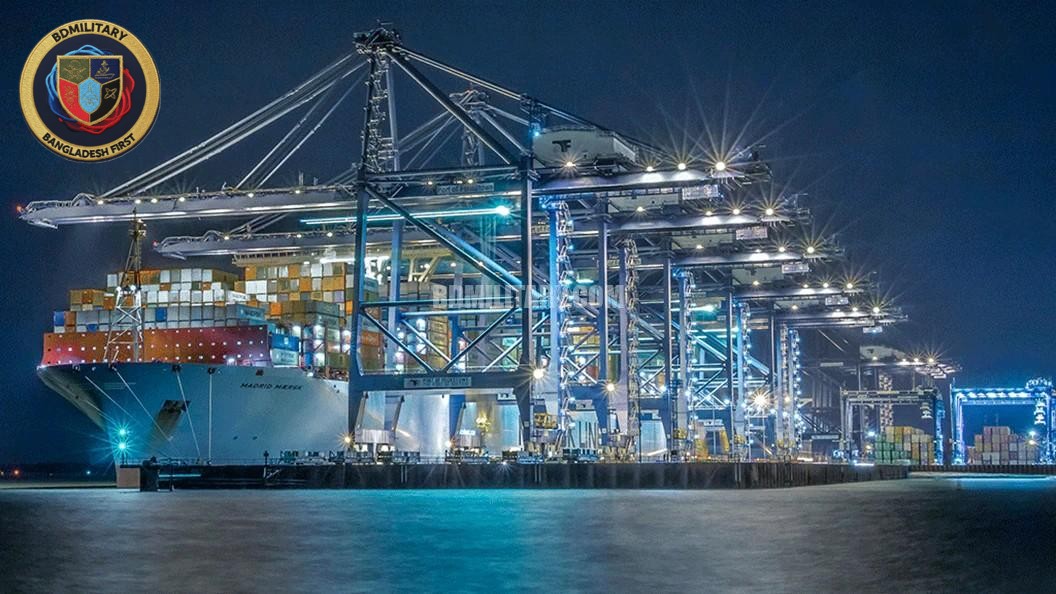In a landmark step towards transforming Bangladesh’s maritime and logistics landscape, the interim government has approved a long-term concession agreement with Netherlands-based APM Terminals BV, a subsidiary of Danish shipping giant AP Møller–Maersk A/S, to design, finance, build, and operate the Laldia Container Terminal at Chattogram Port under a Public–Private Partnership (PPP) model for 30 years.
The final signing of the agreement is scheduled for next week, Public Private Partnership Authority (PPPA) Chief Executive Officer Chowdhury Ashik Mahmud Bin Harun announced at a press conference held at the Foreign Service Academy in Dhaka this afternoon.
As part of the concession, APM Terminals will pay approximately Tk250 crore in signing money to the Government of Bangladesh. The company will serve exclusively as the terminal operator, while port ownership and regulatory oversight will remain with the Chittagong Port Authority (CPA).
Transformative Investment in Bangladesh’s Maritime Infrastructure
Speaking at the briefing, Harun emphasised that the Laldia project marks a decisive shift towards international operational standards in Bangladesh’s port sector.
“The Laldia Container Terminal project will elevate Bangladesh’s port sector to global standards. This is not just an infrastructure investment, but a step toward making Bangladesh’s logistics sector future-ready, ushering in a new era for our exports, employment, and foreign investment,”
— Chowdhury Ashik Mahmud Bin Harun, CEO, PPP Authority.
The Laldia Container Terminal will be developed under a revenue-sharing concession model that ensures a steady flow of foreign-currency income for Bangladesh while significantly reducing the capital expenditure burden on the state.
Under the agreement, APM Terminals — which currently operates more than 60 terminals across 33 countries — will partner with a local joint venture entity to construct and operate the facility. The CPA will retain full ownership of the port and land assets.
A Strategic Global Partnership
APM Terminals is recognised as one of the world’s premier port operators, managing terminals in 10 of the world’s top 20 best-performing ports, according to the World Bank (2024). The company’s entry into Bangladesh is expected to inject around $550 million in Foreign Direct Investment (FDI), representing the single largest European equity investment in the country’s history.
The investment, once completed, is expected to catalyse further FDI in logistics, manufacturing, and ancillary services by signalling renewed investor confidence in Bangladesh’s capacity to host complex, transparent, and internationally benchmarked PPP projects.
Capacity Expansion and Economic Impact
The Laldia Container Terminal will expand Chattogram Port’s container-handling capacity by over 800,000 Twenty-foot Equivalent Units (TEUs) annually — a 44% increase from current levels. The terminal is projected to be fully operational by 2030.
The expansion will alleviate chronic congestion issues at existing facilities such as the New Mooring Terminal and Patenga Container Terminal, while providing the throughput needed to handle Bangladesh’s rapidly growing trade volumes.
The new terminal will also support 24/7 operations, including night navigation for large vessels — a first for Bangladesh — effectively doubling the port’s cargo-handling potential.
Economic, Social, and Strategic Benefits
According to the project summary released by the PPP Authority, the Laldia Terminal’s benefits will extend across multiple dimensions of the national economy and maritime ecosystem:
- Revenue Gains for CPA and the Government: Increased throughput, operational efficiency, and dollar-denominated service charges will enhance CPA’s annual revenues. Tax contributions from APM Terminals and associated marine services will further bolster fiscal earnings.
- Employment and Skills Development: The construction and operation phases are expected to create 500–700 direct jobs and several thousand indirect jobs across supporting industries including trucking, warehousing, and logistics services.
- Technology Transfer and Upskilling: APM Terminals will introduce advanced digital port-management systems and safety standards, alongside in-house training for Bangladeshi engineers, technicians, and managers.
- Reduced Trade Costs: Enhanced efficiency in container handling and reduced vessel waiting times will cut logistics costs, particularly benefitting export-driven sectors such as ready-made garments, agro-processing, and light engineering.
- Environmental Resilience: The terminal will integrate energy-efficient and climate-resilient infrastructure aligned with Bangladesh’s Nationally Determined Contributions (NDCs) under the Paris Agreement, supporting the country’s transition towards greener maritime operations.
- Regional Economic Multiplier Effect: Increased throughput will drive investments in inland container depots (ICDs), cold chains, and industrial zones along the Dhaka–Chattogram corridor, stimulating economic development beyond the port city.
Catalyst for Broader PPP Agenda
The success of this landmark deal could set a precedent for future PPPs across Bangladesh’s infrastructure sectors — from energy to transport and logistics. With APM Terminals’ proven expertise in port automation and lean operational frameworks, the Laldia project is expected to become a model of international best practice in PPP execution.
By demonstrating that Bangladesh can attract, structure, and regulate world-class foreign investments in critical infrastructure, the Laldia project reinforces the country’s ambition to become a regional logistics hub and a maritime gateway between South and Southeast Asia.
Strategic Significance for Bangladesh’s National Security and Trade Posture
From a strategic perspective, the Laldia Terminal will significantly enhance Bangladesh’s maritime resilience, providing the nation with modern port capacity capable of accommodating larger container vessels — effectively doubling existing ship-handling capability.
This expansion strengthens Bangladesh’s supply-chain autonomy, reduces dependence on trans-shipment hubs such as Colombo and Singapore, and enhances maritime security through better-controlled and digitised port operations.
Furthermore, the project’s alignment with sustainability and digital transformation goals positions Chattogram Port as a competitive node in global shipping networks, crucial for maintaining the country’s export competitiveness in the post-LDC era.
Remarks
The upcoming concession agreement between the Government of Bangladesh and Maersk’s APM Terminals BV represents a historic milestone in the evolution of the country’s critical infrastructure. Beyond its sheer scale — both financially and operationally — the Laldia Container Terminal stands as a strategic investment in Bangladesh’s economic sovereignty, global connectivity, and maritime security posture.
If implemented effectively, it could mark the beginning of a new chapter in Bangladesh’s logistics modernisation — one defined by global standards, sustainable growth, and enduring strategic relevance in the Indo-Pacific trade theatre.


